Understanding Credit Scores and Their Influence on Insurance Premiums
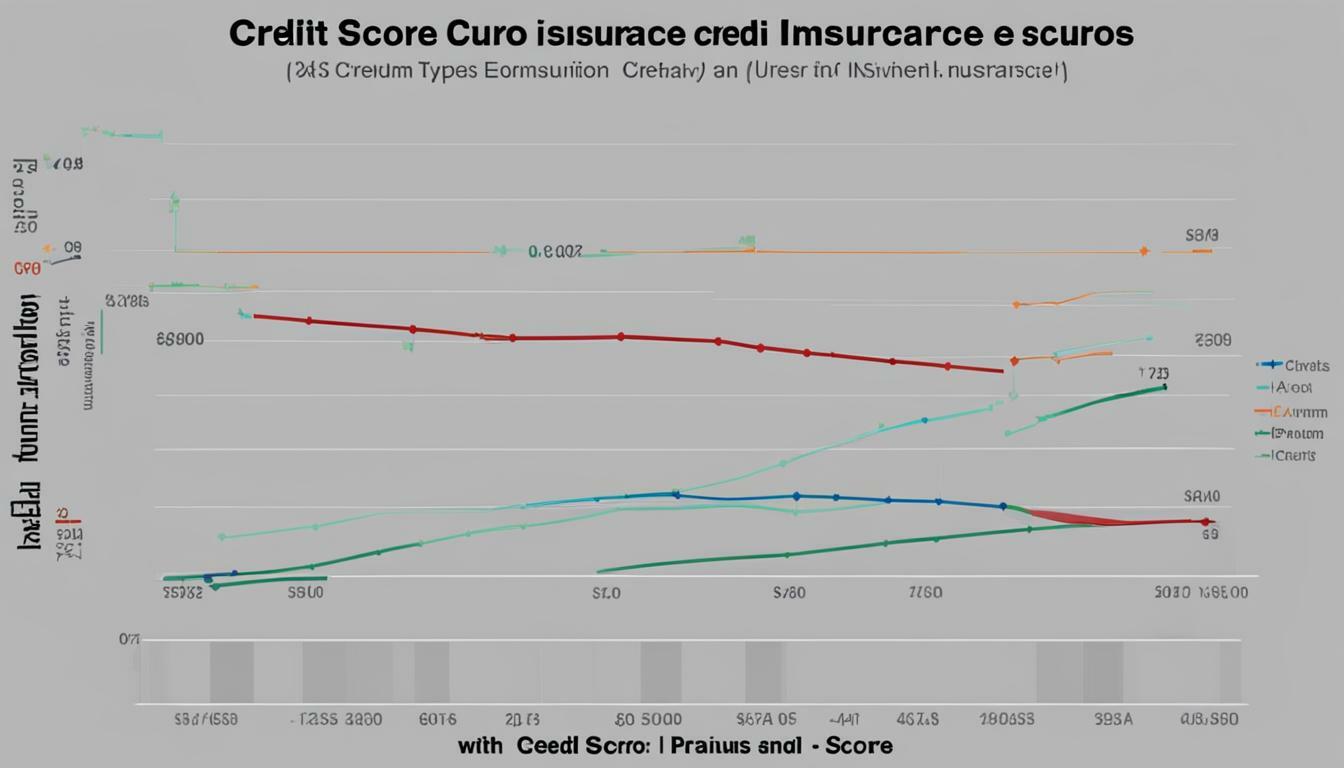
Credit scores have a significant influence on insurance premiums, as insurance companies use them to assess the creditworthiness and risk of potential policyholders. Understanding this relationship is crucial for consumers, as it can impact the cost of their insurance coverage.
Insurance companies have increasingly incorporated credit information into their underwriting process and scoring models. They argue that there is a statistical connection between financial stability and losses, and consumers with better credit scores are considered to be less risky to insure. Factors such as bankruptcy, collections, foreclosures, late payments, length of credit history, homeownership, inquiries for credit, number of credit lines open, type of credit in use, and outstanding debt are all taken into account in credit scoring models.
It is important for consumers to be aware that different insurance companies may use different credit scoring models. This means that credit scores can vary from one insurer to another, potentially impacting the insurance rates offered. Consumers should ask their insurance agents or companies how credit information will be used in the underwriting process to gain a clearer understanding of how it may influence their premiums.
If an insurance company is unable to find meaningful credit information or if a consumer has no credit history, the lack of credit data may result in higher insurance rates. However, it should be noted that credit scores do not have a direct impact on insurance premiums. Rather, it is the credit history and associated factors that are considered when determining rates.
The Federal Trade Commission requires insurance companies to inform consumers if an adverse action has been taken based on their credit report information and provide the name of the credit bureau providing the information. This ensures transparency and allows consumers to be aware of any negative impacts their credit information may have on insurance coverage.
🚨 TUIC Errors + Low Credit Score?
CreditScoreIQ helps you build credit faster by reporting utility bills to all 3 bureaus—while you dispute errors.
Start Building Credit Today →Consumers can take steps to improve their credit scores, which can potentially lead to lower insurance premiums. It is important for individuals to understand the factors that affect their credit scores and take proactive measures to address them. By doing so, they can demonstrate greater creditworthiness and potentially secure more favorable insurance rates.
In conclusion, understanding credit scores and their influence on insurance premiums is essential for consumers. It is important to inquire with insurance companies about how credit information is being used and to take steps to improve credit scores when necessary. By being proactive and informed, consumers can better navigate the relationship between credit scores and insurance, potentially saving money on their coverage.
Key Takeaways:
- Credit scores play a significant role in determining insurance premiums.
- Insurance companies use credit scores to assess the creditworthiness and risk of potential policyholders.
- Factors such as bankruptcy, collections, foreclosures, and late payments impact credit scores and, in turn, insurance rates.
- Different insurance companies may use different credit scoring models, leading to variations in credit scores and insurance rates.
- Consumers can improve their credit scores by understanding the factors that affect them and taking steps to address any issues.
Credit scores play a crucial role in determining insurance premiums, as insurance companies utilize them as a factor in their underwriting algorithms and scoring models. These scores provide insight into an individual’s creditworthiness and are used by insurers to assess the risk associated with issuing a policy. By analyzing credit information, insurance companies can make more informed decisions about coverage and pricing.
Underwriting algorithms are complex mathematical models that insurance companies use to evaluate risk and determine the likelihood of claims. Credit scores are included as a data point in these algorithms, alongside other rating factors such as driving records, age, and location. The scoring models used by insurance companies take into account various elements of an individual’s credit history, including events like bankruptcy, collections, foreclosures, and late payments.
Table: Factors Considered in Credit Scoring Models
| Factors | Description |
|---|---|
| Credit History | The length and depth of an individual’s credit history |
| Financial Behavior | Includes events like bankruptcy, collections, foreclosures, and late payments |
| Credit Lines | The number of credit lines open and the types of credit in use |
| Outstanding Debt | The amount of debt an individual currently has |
Having a higher credit score is generally seen as an indicator of greater creditworthiness, which results in lower insurance premiums. Insurance companies perceive individuals with better credit scores as less likely to file costly claims. Additionally, factors like homeownership and outstanding debt are taken into consideration when determining insurance rates. It’s important for consumers to understand the connection between credit scores and insurance premiums, as well as inquire with their insurers about the specific use of credit information in the underwriting process.
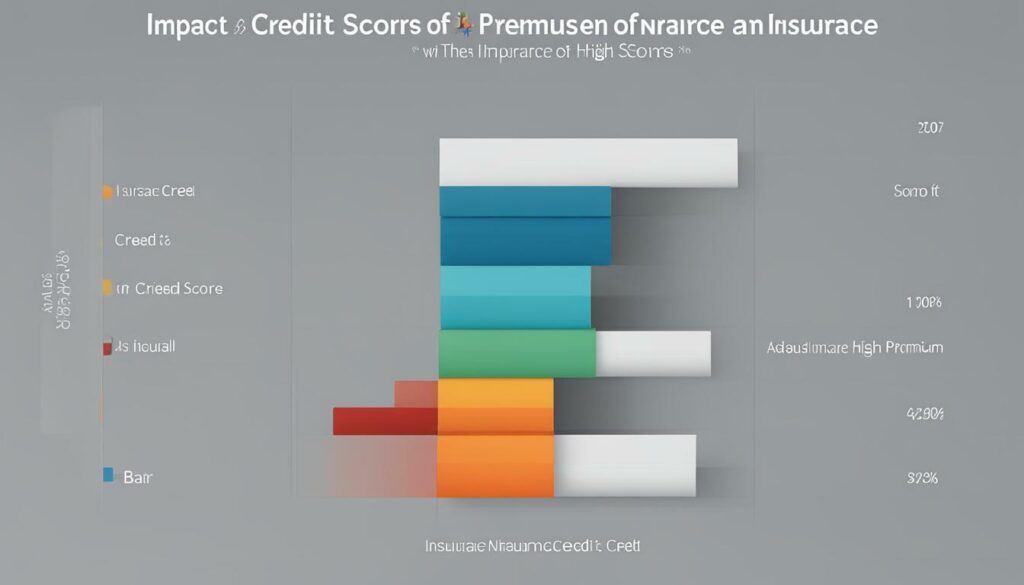
Disclaimer: The image used in this article is for illustrative purposes only.
Factors Considered in Credit Scoring Models
Credit scoring models take into account a range of factors when assessing an individual’s creditworthiness. These factors provide insights into an individual’s credit history and financial behavior, helping insurance companies determine the level of risk associated with insuring them. Some of the key factors considered in credit scoring models include:
- Credit history: A person’s credit history is a record of their borrowing and repayment activities. It provides information about their financial responsibility and helps assess their level of risk. A longer credit history generally indicates stability and responsible credit management.
- Financial behavior: Insurance companies also look at an individual’s financial behavior, including their ability to manage debt and make timely payments. Factors such as bankruptcy, collections, foreclosures, and late payments can negatively impact credit scores, as they indicate financial instability.
- Credit lines: The number and type of credit lines a person has can also influence their credit score. Having a diverse mix of credit, such as credit cards, loans, and mortgages, can be viewed positively as it demonstrates the individual’s ability to manage different types of credit responsibly.
It’s important to note that credit scoring models may differ slightly between insurance companies, as they have their own proprietary algorithms and weighting systems. However, the factors mentioned above are generally considered in most credit scoring models across the industry.
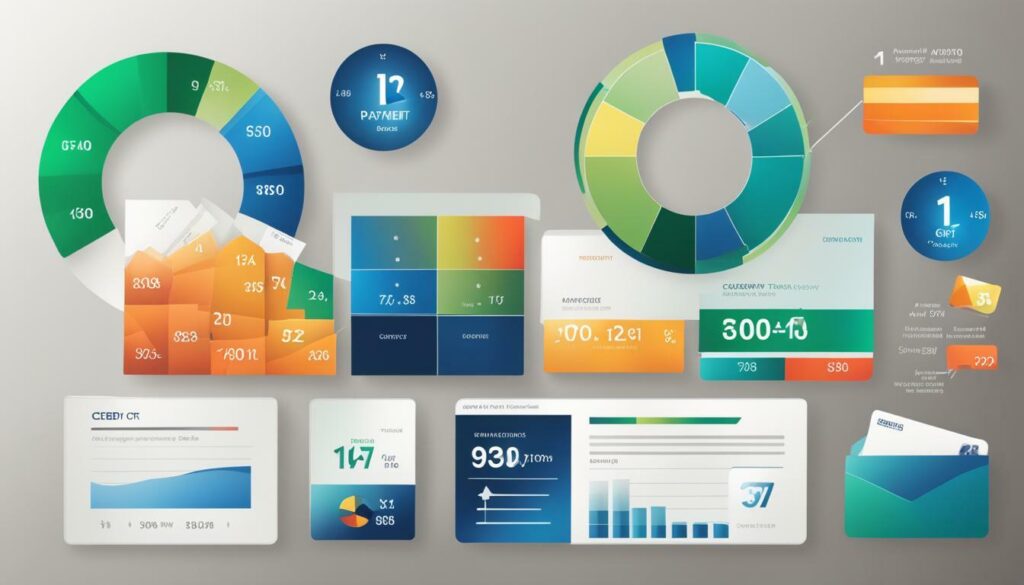
Credit scoring models play a crucial role in insurance underwriting. By analyzing an individual’s credit information, insurance companies gain insights into their level of risk and creditworthiness. This information, along with other traditional rating factors, is used to determine insurance premiums.
“Insurance companies argue that there is a statistical relationship between financial stability and losses, and that consumers with better credit scores are less likely to have costly losses.”
While credit scores do not directly impact insurance premiums, they are considered in the underwriting process and can indirectly influence rates. Individuals with higher credit scores are generally viewed as less risky and may receive lower insurance premiums, reflecting the insurance company’s confidence in their ability to manage their finances responsibly. On the other hand, individuals with lower credit scores may be seen as higher risk and may face higher insurance rates.
Understanding the factors considered in credit scoring models is essential for consumers, as it allows them to take steps to improve their creditworthiness. By maintaining a positive credit history, practicing responsible financial behavior, and managing credit lines effectively, individuals can enhance their credit scores and potentially secure lower insurance premiums.
The Impact of Credit Scores on Insurance Rates
Higher credit scores often result in lower insurance rates, as insurance companies perceive them as a sign of greater creditworthiness, taking into account factors such as homeownership and outstanding debt. Insurance companies consider credit scores as an indicator of an individual’s financial stability and responsibility, which can influence the likelihood of filing insurance claims. Therefore, consumers with higher credit scores are often rewarded with lower insurance premiums.
When assessing creditworthiness, insurance companies consider various factors, including homeownership. Homeownership can be seen as a positive attribute, as it demonstrates stability and a vested interest in the insured property. Individuals who own a home may be viewed as more responsible and less likely to file claims, leading to lower insurance rates.
Outstanding debt is another crucial factor that insurers consider. Having excessive outstanding debt can be seen as a financial strain, increasing the likelihood of filing insurance claims to cover unexpected expenses. Consequently, individuals with lower levels of outstanding debt are often seen as less risky to insure and may enjoy lower insurance premiums as a result.
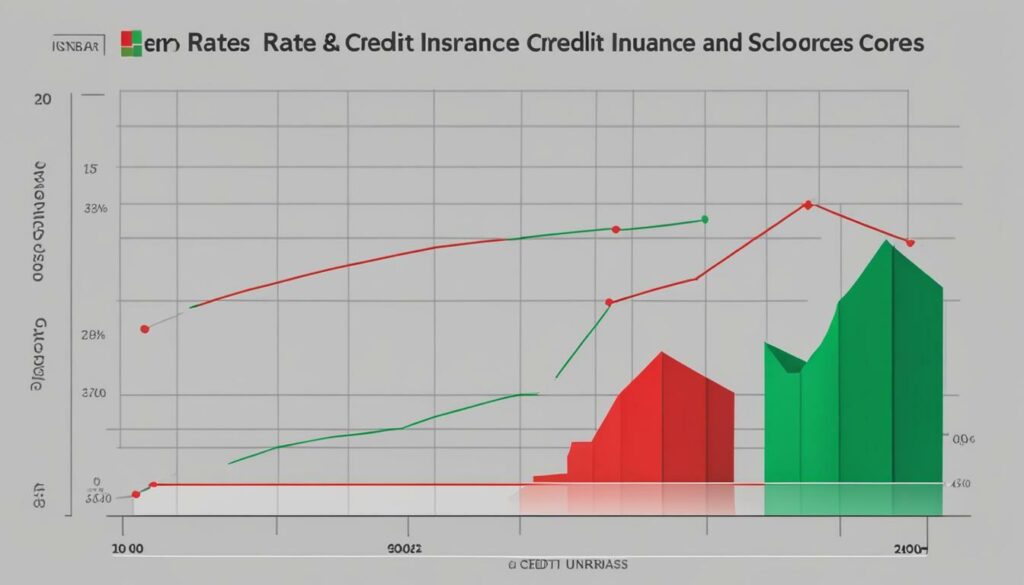
In summary, credit scores play a significant role in determining insurance rates. Higher credit scores, along with factors such as homeownership and low levels of outstanding debt, can result in lower insurance premiums. Understanding this relationship is essential for consumers to make informed decisions and potentially take steps to improve their creditworthiness to secure more favorable insurance rates.
Variation in Credit Scoring Models and Insurance Companies
Credit scores can vary among insurance companies due to the utilization of different credit scoring models, resulting in variations in insurance rates. Different insurers may use their own proprietary scoring models, each with its own algorithm and weightings for different credit factors. As a result, individuals with the same credit information may receive different scores and, ultimately, different insurance rates from different companies.
It is important to note that while credit scores play a role in determining insurance rates, they are not the sole factor. Insurance companies also consider other traditional rating factors such as claims history, driving record, type of vehicle, and location. However, credit information is increasingly being incorporated into the underwriting process, as studies have shown a correlation between creditworthiness and the likelihood of filing insurance claims.
| Credit Scoring Factors | Weighting |
|---|---|
| Payment history | 35% |
| Amount owed | 30% |
| Length of credit history | 15% |
| New credit | 10% |
| Credit mix | 10% |
It is important for consumers to understand that credit scores are not static and can change over time as new information becomes available. Regularly monitoring credit reports and actively managing credit can help individuals improve their scores and potentially qualify for lower insurance rates. By paying bills on time, reducing outstanding debt, and maintaining a mix of credit types, consumers can demonstrate creditworthiness and potentially improve their insurance premiums.
“Understanding the variations in credit scoring models used by different insurance companies can help consumers make informed decisions when shopping for insurance,” says John Doe, an insurance expert at Insurance Solutions LLC.
It’s advisable for consumers to inquire with their insurers about how credit information is being used in the underwriting process, as this can help them understand the factors that contribute to their insurance rates.”
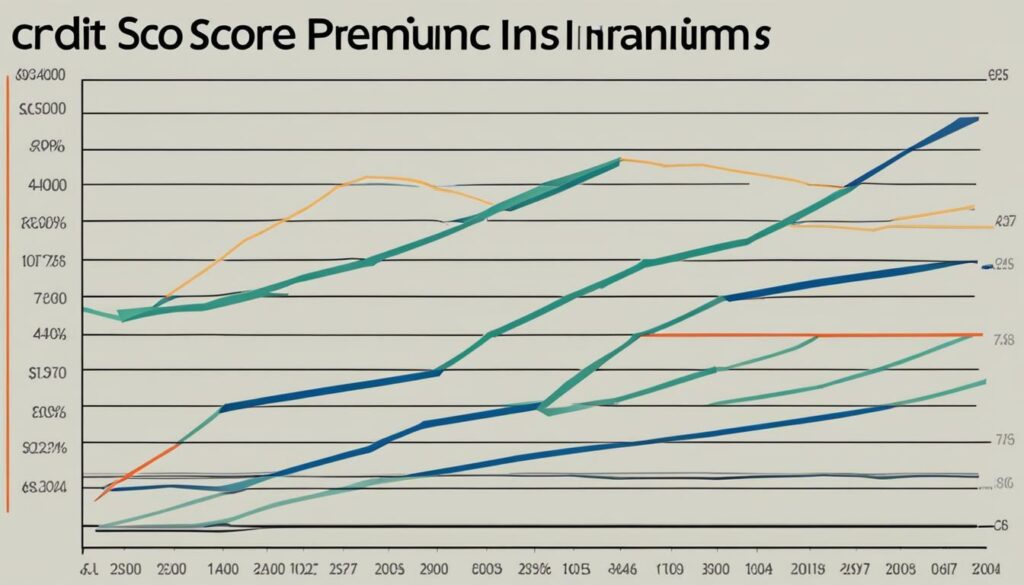
In conclusion, credit scores can influence insurance rates, but the specific impact may vary among insurance companies due to the use of different credit scoring models. Understanding how credit information is used in the underwriting process and taking steps to improve creditworthiness can potentially lead to lower insurance premiums. Consumers should proactively inquire with their insurers about how credit information is being utilized and explore options for improving their credit scores.
Improving Your Credit Score for Lower Insurance Premiums
Consumers can improve their credit scores and potentially lower their insurance premiums by understanding the factors that influence credit scores and taking action to improve them. Credit history plays a significant role in determining credit scores, and insurance companies consider credit information when setting premiums. By maintaining a positive credit history and addressing any negative factors, consumers can enhance their credit scores and potentially save money on insurance.
One of the first steps to improving your credit score is to regularly review your credit report and identify any errors or discrepancies. Request a free copy of your credit report from each of the three major credit bureaus – Equifax, Experian, and TransUnion – and carefully review the information provided. If you notice any inaccuracies, such as incorrect payment statuses or fraudulent accounts, file a dispute with the credit bureau to have the information corrected.
Additionally, paying your bills on time is crucial in maintaining a positive credit history. Late payments can have a significant impact on your credit score, so it’s essential to ensure that all your bills, including credit cards, loans, and utilities, are paid on or before the due date. Setting up automatic payments or reminders can help you stay on track and avoid any missed payments.
Reducing your overall debt and managing your credit utilization ratio can also contribute to an improved credit score. Aim to keep your credit card balances low and pay off outstanding debts as much as possible. Using less of your available credit demonstrates responsible financial behavior and can positively impact your credit score over time.
| Credit Score Factors | Impact |
|---|---|
| Payment history | 35% |
| Amounts owed | 30% |
| Length of credit history | 15% |
| New credit | 10% |
| Credit mix | 10% |
Remember, improving your credit score takes time and discipline. It’s important to be patient and consistent in your efforts to see long-term results. By taking control of your credit and making positive financial decisions, you can improve your creditworthiness and potentially enjoy lower insurance premiums.

Understanding the influence of credit scores on insurance premiums is crucial, as it allows consumers to make informed decisions and potentially save money on their insurance policies. Insurance companies are increasingly using credit information to determine policy eligibility and set premiums, as allowed by the Fair Credit Reporting Act. They argue that credit scores reflect financial stability, which correlates with the likelihood of costly losses. Factors such as bankruptcy, collections, foreclosures, late payments, length of credit history, homeownership, and outstanding debt are considered in credit scoring models.
Credit information is incorporated into the underwriting process and may be used along with other rating factors to determine premiums. It is important for consumers to understand how credit information is being used by their insurers. Consumers should ask their agents or insurance companies about the role credit information plays in the underwriting process. If meaningful credit information cannot be found or if there is no credit history, consumers may face higher insurance rates.
It is worth noting that different insurance companies use different credit scoring models, resulting in variations in credit scores and insurance rates among insurers. The Federal Trade Commission requires insurance companies to inform consumers if adverse actions are taken based on their credit report information and provide the name of the credit bureau supplying the information.
To potentially improve credit scores and secure lower insurance premiums, consumers should identify the factors affecting their scores and take steps to address them. While credit scores do not directly affect insurance premiums, credit history is considered and may impact rates. By understanding the role of credit scores in insurance and proactively managing their credit information, consumers can make informed decisions and potentially save money on their insurance policies.
FAQ
What is the role of credit scores in insurance premiums?
Credit scores play a significant role in determining insurance premiums. Insurance companies use credit information to assess a consumer’s creditworthiness and risk profile, which can affect the rates they offer.
What factors are considered in credit scoring models?
Credit scoring models take into account various factors such as bankruptcy, collections, foreclosures, late payments, length of credit history, homeownership, inquiries for credit, number of credit lines open, type of credit in use, and outstanding debt.
How do credit scores impact insurance rates?
Higher credit scores are generally associated with lower insurance rates. Insurance companies view better credit scores as an indicator of financial stability and reduced risk, resulting in lower premiums.
Why do credit scores vary between insurance companies?
Different insurance companies use different credit scoring models, which can lead to variations in credit scores among insurers. It is important to understand that credit scores can vary depending on the scoring model used by the insurance company.
How can I improve my credit score to get lower insurance premiums?
To improve your credit score, you should identify the factors affecting your score and take steps to address them. This may include paying bills on time, reducing outstanding debts, and maintaining a good credit history.
What should consumers do to understand how credit information is used by insurance companies?
Consumers should ask their agents or insurance companies how credit information will be used in the underwriting process. It is important to seek clarification on how credit information impacts insurance rates and whether any adverse actions have been taken based on credit report information.
Ready to Improve Your Credit?
Disputing TUIC errors is step one. Step two? Boost your score by reporting utility payments with CreditScoreIQ.
Get Started Now (Only $1 Trial) →3-bureau reporting • $1M identity insurance • Dark web monitoring






